Oral Contracts and Common Law: Australian Contract Law and Cases
VerifiedAdded on 2023/01/16
|6
|1745
|60
Essay
AI Summary
This essay delves into the intricacies of oral contracts within the framework of Australian common law. It begins by defining oral contracts and highlighting the challenges associated with their enforceability, particularly the "she said, he said" dilemma and the difficulty of providing concrete evidence. The essay then explores the requirements that make an oral contract legally binding, such as the presence of an offer, acceptance, consideration, and the competence of the parties involved. It analyzes the application of relevant statutes, including the Statute of Limitations and the Statute of Frauds, in cases of breach of oral contracts. The essay further examines the arguments that can be made by parties seeking to uphold or challenge such agreements, considering the role of witnesses, the concept of a "meeting of minds," and the impact of written contracts. Finally, it addresses the responsibilities of both parties in establishing an oral contract and the potential legal ramifications of failing to adhere to the agreed-upon terms, with a specific focus on consumer protection under Australian law. The essay concludes by summarizing the key considerations for proving the validity and enforceability of oral contracts in Australia, providing valuable insights into the legal principles and practical challenges involved.
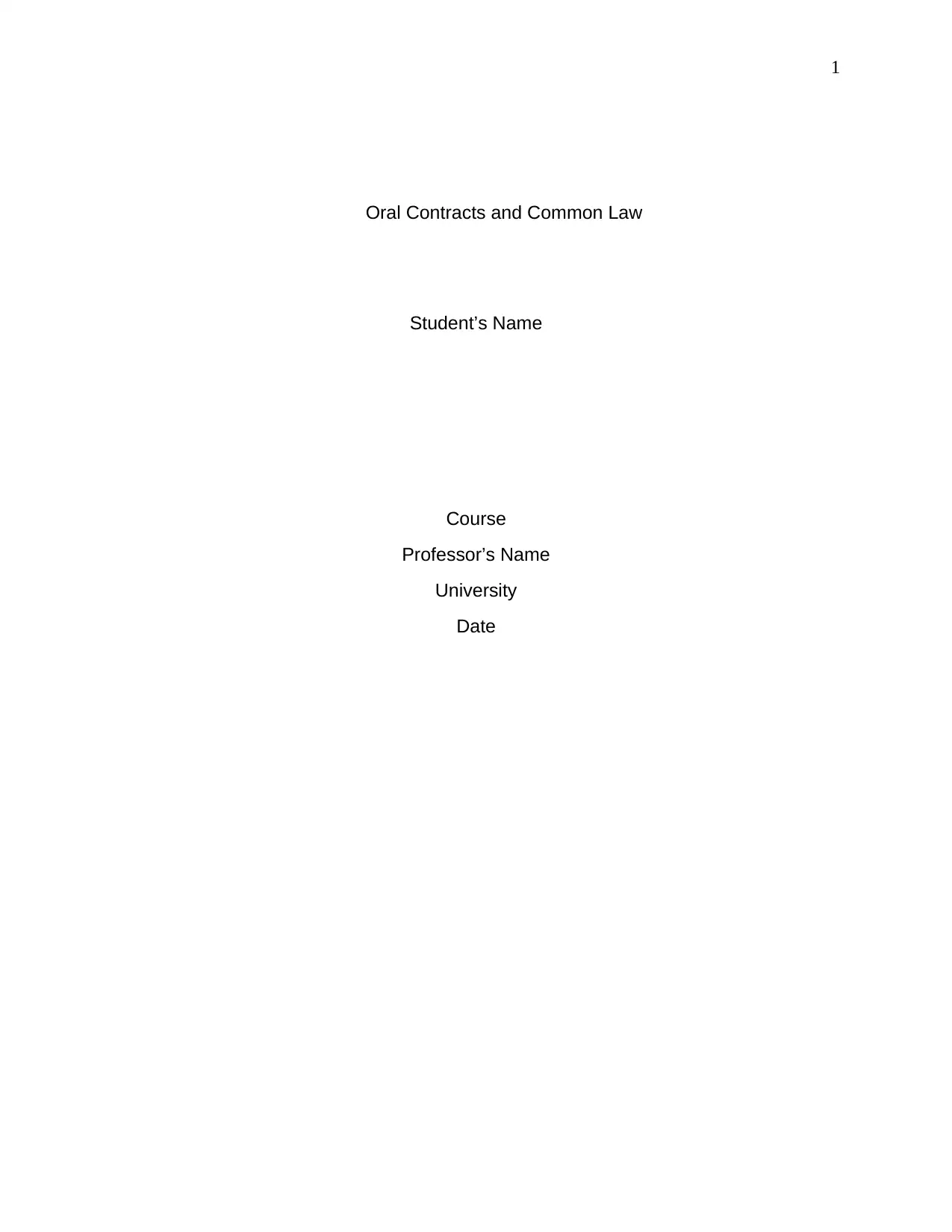
1
Oral Contracts and Common Law
Student’s Name
Course
Professor’s Name
University
Date
Oral Contracts and Common Law
Student’s Name
Course
Professor’s Name
University
Date
Paraphrase This Document
Need a fresh take? Get an instant paraphrase of this document with our AI Paraphraser
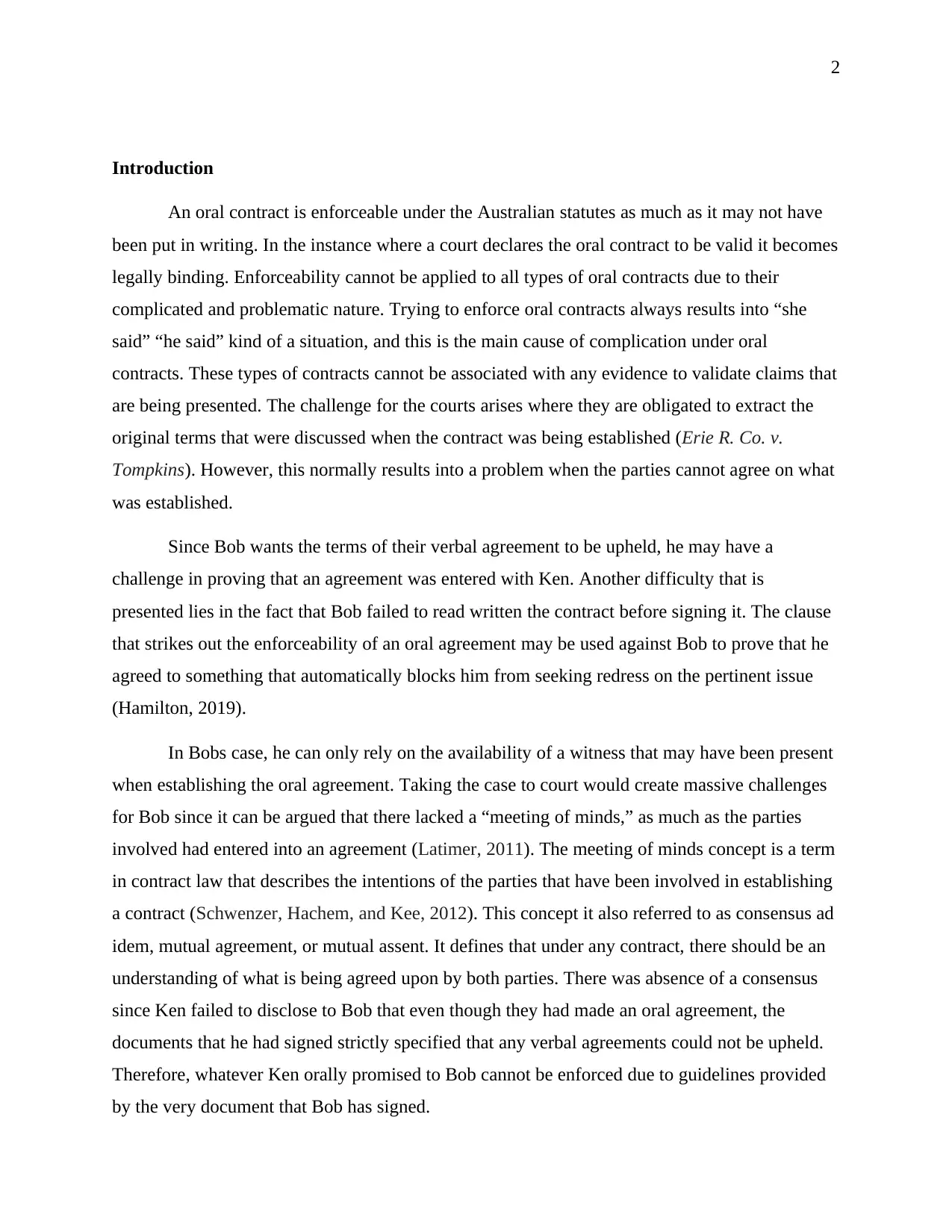
2
Introduction
An oral contract is enforceable under the Australian statutes as much as it may not have
been put in writing. In the instance where a court declares the oral contract to be valid it becomes
legally binding. Enforceability cannot be applied to all types of oral contracts due to their
complicated and problematic nature. Trying to enforce oral contracts always results into “she
said” “he said” kind of a situation, and this is the main cause of complication under oral
contracts. These types of contracts cannot be associated with any evidence to validate claims that
are being presented. The challenge for the courts arises where they are obligated to extract the
original terms that were discussed when the contract was being established (Erie R. Co. v.
Tompkins). However, this normally results into a problem when the parties cannot agree on what
was established.
Since Bob wants the terms of their verbal agreement to be upheld, he may have a
challenge in proving that an agreement was entered with Ken. Another difficulty that is
presented lies in the fact that Bob failed to read written the contract before signing it. The clause
that strikes out the enforceability of an oral agreement may be used against Bob to prove that he
agreed to something that automatically blocks him from seeking redress on the pertinent issue
(Hamilton, 2019).
In Bobs case, he can only rely on the availability of a witness that may have been present
when establishing the oral agreement. Taking the case to court would create massive challenges
for Bob since it can be argued that there lacked a “meeting of minds,” as much as the parties
involved had entered into an agreement (Latimer, 2011). The meeting of minds concept is a term
in contract law that describes the intentions of the parties that have been involved in establishing
a contract (Schwenzer, Hachem, and Kee, 2012). This concept it also referred to as consensus ad
idem, mutual agreement, or mutual assent. It defines that under any contract, there should be an
understanding of what is being agreed upon by both parties. There was absence of a consensus
since Ken failed to disclose to Bob that even though they had made an oral agreement, the
documents that he had signed strictly specified that any verbal agreements could not be upheld.
Therefore, whatever Ken orally promised to Bob cannot be enforced due to guidelines provided
by the very document that Bob has signed.
Introduction
An oral contract is enforceable under the Australian statutes as much as it may not have
been put in writing. In the instance where a court declares the oral contract to be valid it becomes
legally binding. Enforceability cannot be applied to all types of oral contracts due to their
complicated and problematic nature. Trying to enforce oral contracts always results into “she
said” “he said” kind of a situation, and this is the main cause of complication under oral
contracts. These types of contracts cannot be associated with any evidence to validate claims that
are being presented. The challenge for the courts arises where they are obligated to extract the
original terms that were discussed when the contract was being established (Erie R. Co. v.
Tompkins). However, this normally results into a problem when the parties cannot agree on what
was established.
Since Bob wants the terms of their verbal agreement to be upheld, he may have a
challenge in proving that an agreement was entered with Ken. Another difficulty that is
presented lies in the fact that Bob failed to read written the contract before signing it. The clause
that strikes out the enforceability of an oral agreement may be used against Bob to prove that he
agreed to something that automatically blocks him from seeking redress on the pertinent issue
(Hamilton, 2019).
In Bobs case, he can only rely on the availability of a witness that may have been present
when establishing the oral agreement. Taking the case to court would create massive challenges
for Bob since it can be argued that there lacked a “meeting of minds,” as much as the parties
involved had entered into an agreement (Latimer, 2011). The meeting of minds concept is a term
in contract law that describes the intentions of the parties that have been involved in establishing
a contract (Schwenzer, Hachem, and Kee, 2012). This concept it also referred to as consensus ad
idem, mutual agreement, or mutual assent. It defines that under any contract, there should be an
understanding of what is being agreed upon by both parties. There was absence of a consensus
since Ken failed to disclose to Bob that even though they had made an oral agreement, the
documents that he had signed strictly specified that any verbal agreements could not be upheld.
Therefore, whatever Ken orally promised to Bob cannot be enforced due to guidelines provided
by the very document that Bob has signed.
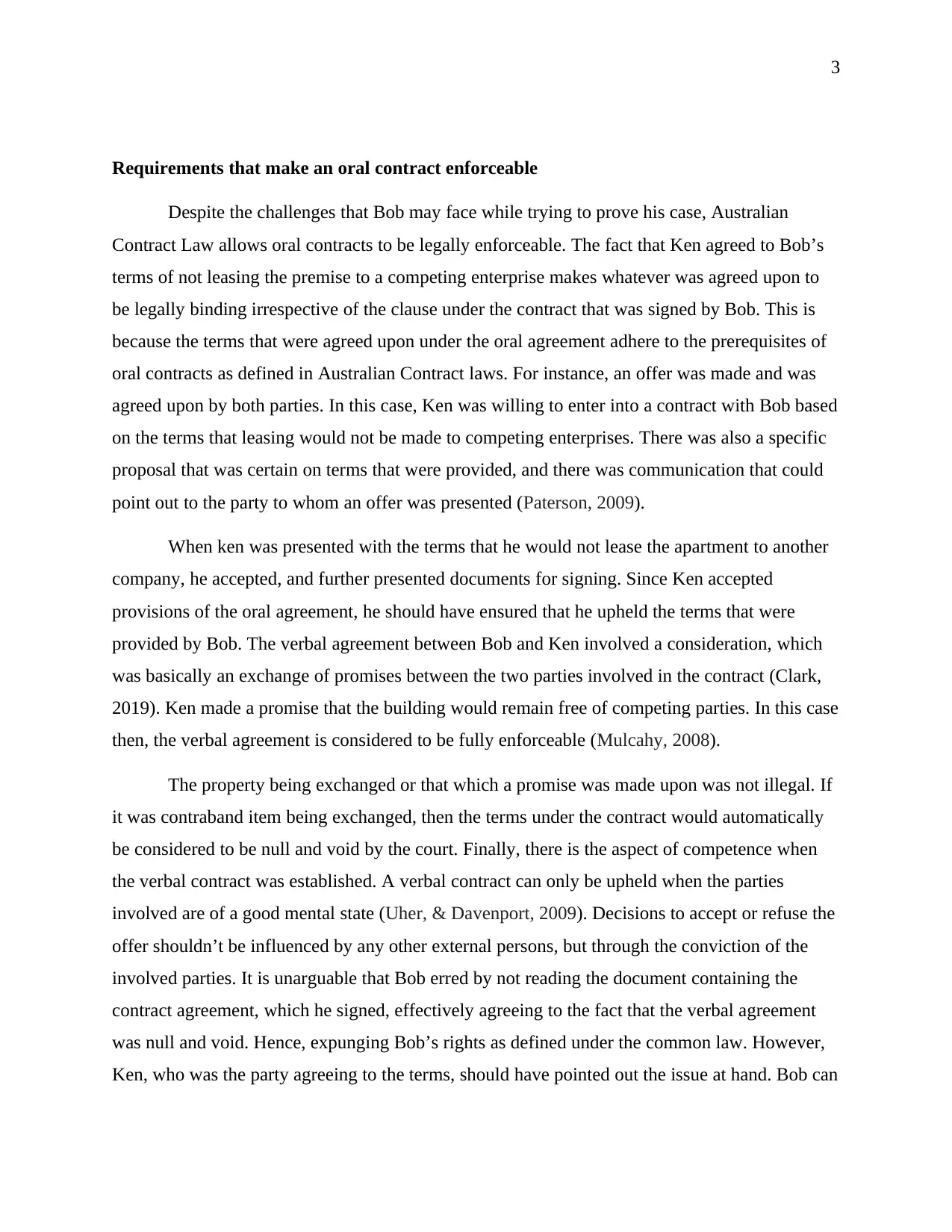
3
Requirements that make an oral contract enforceable
Despite the challenges that Bob may face while trying to prove his case, Australian
Contract Law allows oral contracts to be legally enforceable. The fact that Ken agreed to Bob’s
terms of not leasing the premise to a competing enterprise makes whatever was agreed upon to
be legally binding irrespective of the clause under the contract that was signed by Bob. This is
because the terms that were agreed upon under the oral agreement adhere to the prerequisites of
oral contracts as defined in Australian Contract laws. For instance, an offer was made and was
agreed upon by both parties. In this case, Ken was willing to enter into a contract with Bob based
on the terms that leasing would not be made to competing enterprises. There was also a specific
proposal that was certain on terms that were provided, and there was communication that could
point out to the party to whom an offer was presented (Paterson, 2009).
When ken was presented with the terms that he would not lease the apartment to another
company, he accepted, and further presented documents for signing. Since Ken accepted
provisions of the oral agreement, he should have ensured that he upheld the terms that were
provided by Bob. The verbal agreement between Bob and Ken involved a consideration, which
was basically an exchange of promises between the two parties involved in the contract (Clark,
2019). Ken made a promise that the building would remain free of competing parties. In this case
then, the verbal agreement is considered to be fully enforceable (Mulcahy, 2008).
The property being exchanged or that which a promise was made upon was not illegal. If
it was contraband item being exchanged, then the terms under the contract would automatically
be considered to be null and void by the court. Finally, there is the aspect of competence when
the verbal contract was established. A verbal contract can only be upheld when the parties
involved are of a good mental state (Uher, & Davenport, 2009). Decisions to accept or refuse the
offer shouldn’t be influenced by any other external persons, but through the conviction of the
involved parties. It is unarguable that Bob erred by not reading the document containing the
contract agreement, which he signed, effectively agreeing to the fact that the verbal agreement
was null and void. Hence, expunging Bob’s rights as defined under the common law. However,
Ken, who was the party agreeing to the terms, should have pointed out the issue at hand. Bob can
Requirements that make an oral contract enforceable
Despite the challenges that Bob may face while trying to prove his case, Australian
Contract Law allows oral contracts to be legally enforceable. The fact that Ken agreed to Bob’s
terms of not leasing the premise to a competing enterprise makes whatever was agreed upon to
be legally binding irrespective of the clause under the contract that was signed by Bob. This is
because the terms that were agreed upon under the oral agreement adhere to the prerequisites of
oral contracts as defined in Australian Contract laws. For instance, an offer was made and was
agreed upon by both parties. In this case, Ken was willing to enter into a contract with Bob based
on the terms that leasing would not be made to competing enterprises. There was also a specific
proposal that was certain on terms that were provided, and there was communication that could
point out to the party to whom an offer was presented (Paterson, 2009).
When ken was presented with the terms that he would not lease the apartment to another
company, he accepted, and further presented documents for signing. Since Ken accepted
provisions of the oral agreement, he should have ensured that he upheld the terms that were
provided by Bob. The verbal agreement between Bob and Ken involved a consideration, which
was basically an exchange of promises between the two parties involved in the contract (Clark,
2019). Ken made a promise that the building would remain free of competing parties. In this case
then, the verbal agreement is considered to be fully enforceable (Mulcahy, 2008).
The property being exchanged or that which a promise was made upon was not illegal. If
it was contraband item being exchanged, then the terms under the contract would automatically
be considered to be null and void by the court. Finally, there is the aspect of competence when
the verbal contract was established. A verbal contract can only be upheld when the parties
involved are of a good mental state (Uher, & Davenport, 2009). Decisions to accept or refuse the
offer shouldn’t be influenced by any other external persons, but through the conviction of the
involved parties. It is unarguable that Bob erred by not reading the document containing the
contract agreement, which he signed, effectively agreeing to the fact that the verbal agreement
was null and void. Hence, expunging Bob’s rights as defined under the common law. However,
Ken, who was the party agreeing to the terms, should have pointed out the issue at hand. Bob can
⊘ This is a preview!⊘
Do you want full access?
Subscribe today to unlock all pages.

Trusted by 1+ million students worldwide
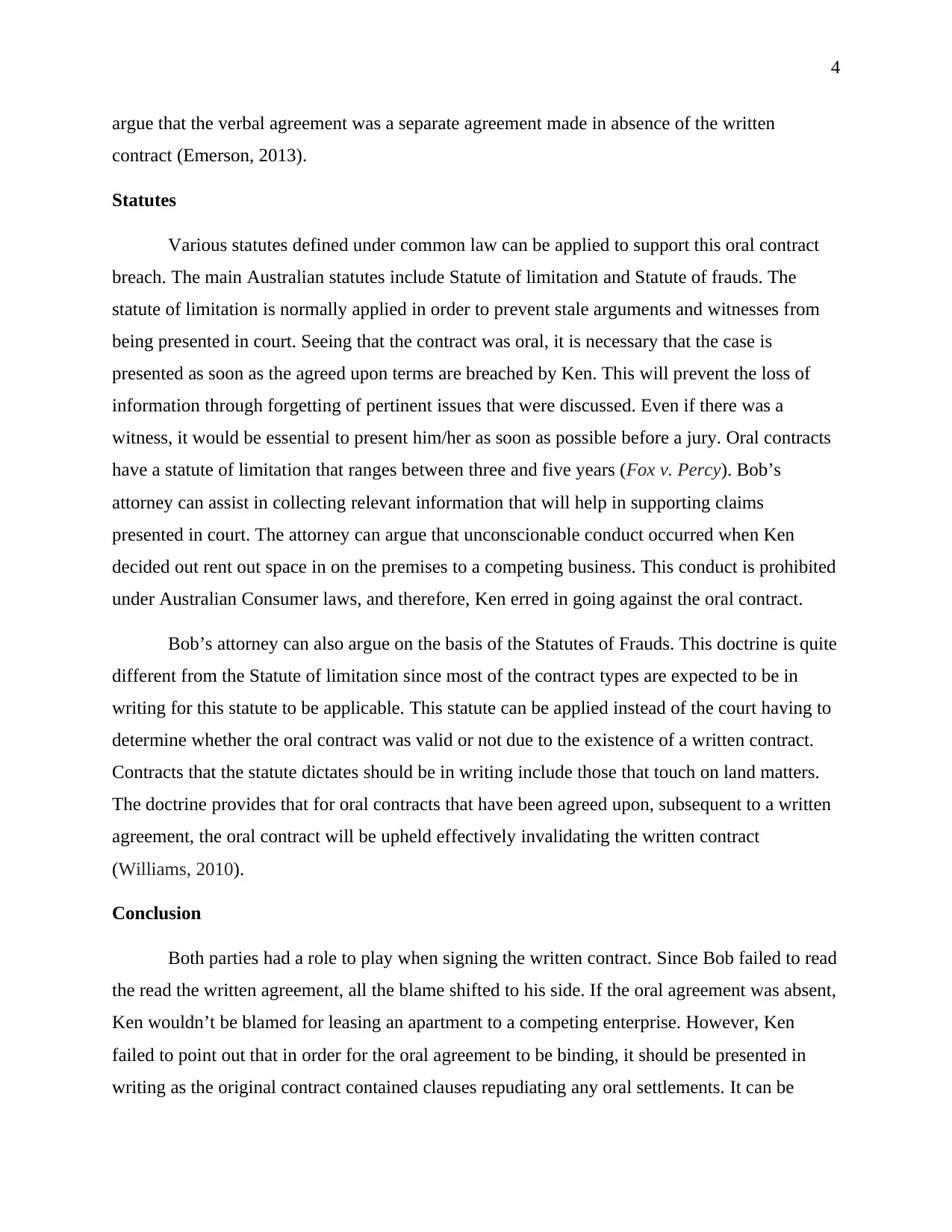
4
argue that the verbal agreement was a separate agreement made in absence of the written
contract (Emerson, 2013).
Statutes
Various statutes defined under common law can be applied to support this oral contract
breach. The main Australian statutes include Statute of limitation and Statute of frauds. The
statute of limitation is normally applied in order to prevent stale arguments and witnesses from
being presented in court. Seeing that the contract was oral, it is necessary that the case is
presented as soon as the agreed upon terms are breached by Ken. This will prevent the loss of
information through forgetting of pertinent issues that were discussed. Even if there was a
witness, it would be essential to present him/her as soon as possible before a jury. Oral contracts
have a statute of limitation that ranges between three and five years (Fox v. Percy). Bob’s
attorney can assist in collecting relevant information that will help in supporting claims
presented in court. The attorney can argue that unconscionable conduct occurred when Ken
decided out rent out space in on the premises to a competing business. This conduct is prohibited
under Australian Consumer laws, and therefore, Ken erred in going against the oral contract.
Bob’s attorney can also argue on the basis of the Statutes of Frauds. This doctrine is quite
different from the Statute of limitation since most of the contract types are expected to be in
writing for this statute to be applicable. This statute can be applied instead of the court having to
determine whether the oral contract was valid or not due to the existence of a written contract.
Contracts that the statute dictates should be in writing include those that touch on land matters.
The doctrine provides that for oral contracts that have been agreed upon, subsequent to a written
agreement, the oral contract will be upheld effectively invalidating the written contract
(Williams, 2010).
Conclusion
Both parties had a role to play when signing the written contract. Since Bob failed to read
the read the written agreement, all the blame shifted to his side. If the oral agreement was absent,
Ken wouldn’t be blamed for leasing an apartment to a competing enterprise. However, Ken
failed to point out that in order for the oral agreement to be binding, it should be presented in
writing as the original contract contained clauses repudiating any oral settlements. It can be
argue that the verbal agreement was a separate agreement made in absence of the written
contract (Emerson, 2013).
Statutes
Various statutes defined under common law can be applied to support this oral contract
breach. The main Australian statutes include Statute of limitation and Statute of frauds. The
statute of limitation is normally applied in order to prevent stale arguments and witnesses from
being presented in court. Seeing that the contract was oral, it is necessary that the case is
presented as soon as the agreed upon terms are breached by Ken. This will prevent the loss of
information through forgetting of pertinent issues that were discussed. Even if there was a
witness, it would be essential to present him/her as soon as possible before a jury. Oral contracts
have a statute of limitation that ranges between three and five years (Fox v. Percy). Bob’s
attorney can assist in collecting relevant information that will help in supporting claims
presented in court. The attorney can argue that unconscionable conduct occurred when Ken
decided out rent out space in on the premises to a competing business. This conduct is prohibited
under Australian Consumer laws, and therefore, Ken erred in going against the oral contract.
Bob’s attorney can also argue on the basis of the Statutes of Frauds. This doctrine is quite
different from the Statute of limitation since most of the contract types are expected to be in
writing for this statute to be applicable. This statute can be applied instead of the court having to
determine whether the oral contract was valid or not due to the existence of a written contract.
Contracts that the statute dictates should be in writing include those that touch on land matters.
The doctrine provides that for oral contracts that have been agreed upon, subsequent to a written
agreement, the oral contract will be upheld effectively invalidating the written contract
(Williams, 2010).
Conclusion
Both parties had a role to play when signing the written contract. Since Bob failed to read
the read the written agreement, all the blame shifted to his side. If the oral agreement was absent,
Ken wouldn’t be blamed for leasing an apartment to a competing enterprise. However, Ken
failed to point out that in order for the oral agreement to be binding, it should be presented in
writing as the original contract contained clauses repudiating any oral settlements. It can be
Paraphrase This Document
Need a fresh take? Get an instant paraphrase of this document with our AI Paraphraser

5
argued that Ken had an ulterior motive and did not have Bob’s interests at heart when entering
into the written agreement. If Bob’s attorney argues on the basis of the Statutes of Frauds, then
he might be able to prove that Bob’s interest as a consumer were violated as defined under
Australian consumer laws.
argued that Ken had an ulterior motive and did not have Bob’s interests at heart when entering
into the written agreement. If Bob’s attorney argues on the basis of the Statutes of Frauds, then
he might be able to prove that Bob’s interest as a consumer were violated as defined under
Australian consumer laws.
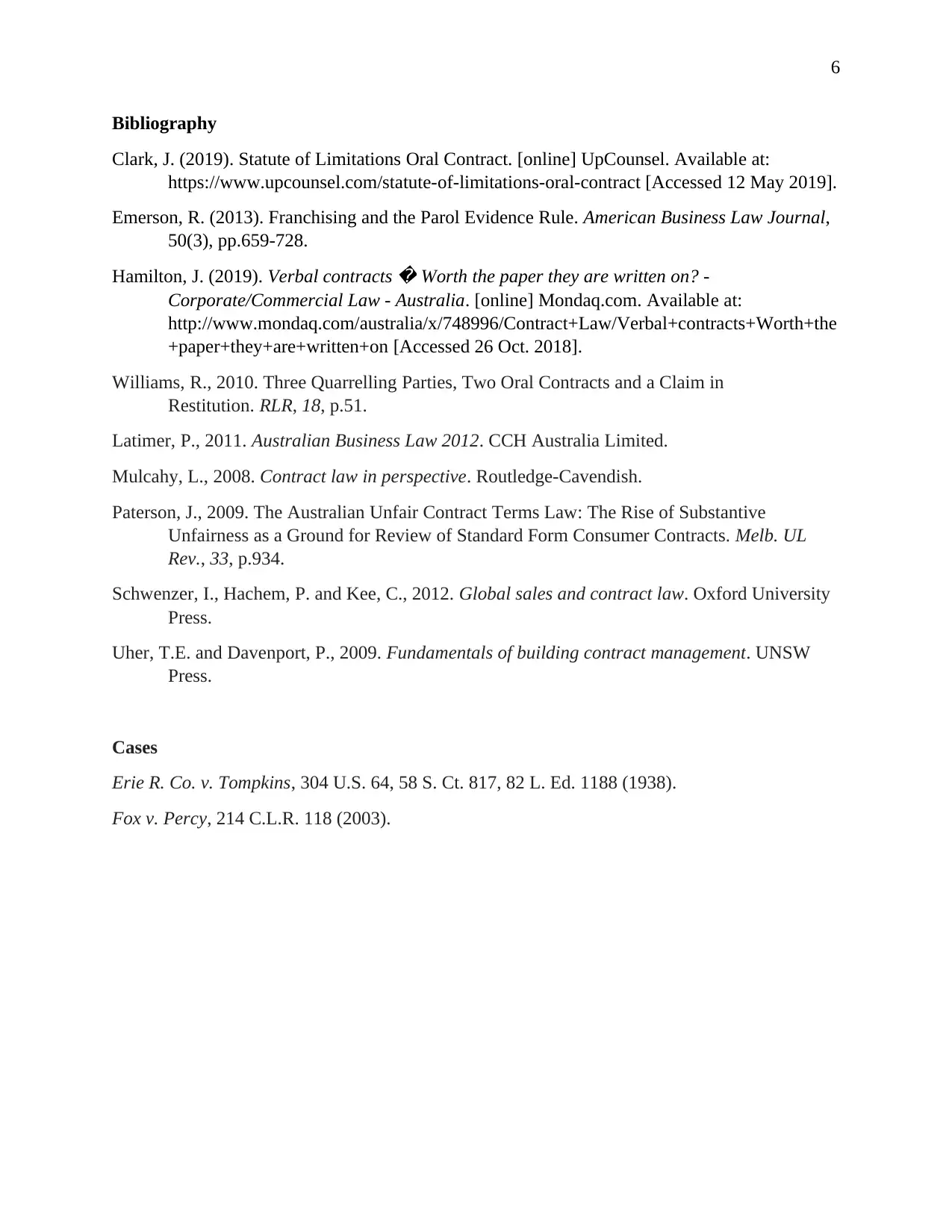
6
Bibliography
Clark, J. (2019). Statute of Limitations Oral Contract. [online] UpCounsel. Available at:
https://www.upcounsel.com/statute-of-limitations-oral-contract [Accessed 12 May 2019].
Emerson, R. (2013). Franchising and the Parol Evidence Rule. American Business Law Journal,
50(3), pp.659-728.
Hamilton, J. (2019). Verbal contracts � Worth the paper they are written on? -
Corporate/Commercial Law - Australia. [online] Mondaq.com. Available at:
http://www.mondaq.com/australia/x/748996/Contract+Law/Verbal+contracts+Worth+the
+paper+they+are+written+on [Accessed 26 Oct. 2018].
Williams, R., 2010. Three Quarrelling Parties, Two Oral Contracts and a Claim in
Restitution. RLR, 18, p.51.
Latimer, P., 2011. Australian Business Law 2012. CCH Australia Limited.
Mulcahy, L., 2008. Contract law in perspective. Routledge-Cavendish.
Paterson, J., 2009. The Australian Unfair Contract Terms Law: The Rise of Substantive
Unfairness as a Ground for Review of Standard Form Consumer Contracts. Melb. UL
Rev., 33, p.934.
Schwenzer, I., Hachem, P. and Kee, C., 2012. Global sales and contract law. Oxford University
Press.
Uher, T.E. and Davenport, P., 2009. Fundamentals of building contract management. UNSW
Press.
Cases
Erie R. Co. v. Tompkins, 304 U.S. 64, 58 S. Ct. 817, 82 L. Ed. 1188 (1938).
Fox v. Percy, 214 C.L.R. 118 (2003).
Bibliography
Clark, J. (2019). Statute of Limitations Oral Contract. [online] UpCounsel. Available at:
https://www.upcounsel.com/statute-of-limitations-oral-contract [Accessed 12 May 2019].
Emerson, R. (2013). Franchising and the Parol Evidence Rule. American Business Law Journal,
50(3), pp.659-728.
Hamilton, J. (2019). Verbal contracts � Worth the paper they are written on? -
Corporate/Commercial Law - Australia. [online] Mondaq.com. Available at:
http://www.mondaq.com/australia/x/748996/Contract+Law/Verbal+contracts+Worth+the
+paper+they+are+written+on [Accessed 26 Oct. 2018].
Williams, R., 2010. Three Quarrelling Parties, Two Oral Contracts and a Claim in
Restitution. RLR, 18, p.51.
Latimer, P., 2011. Australian Business Law 2012. CCH Australia Limited.
Mulcahy, L., 2008. Contract law in perspective. Routledge-Cavendish.
Paterson, J., 2009. The Australian Unfair Contract Terms Law: The Rise of Substantive
Unfairness as a Ground for Review of Standard Form Consumer Contracts. Melb. UL
Rev., 33, p.934.
Schwenzer, I., Hachem, P. and Kee, C., 2012. Global sales and contract law. Oxford University
Press.
Uher, T.E. and Davenport, P., 2009. Fundamentals of building contract management. UNSW
Press.
Cases
Erie R. Co. v. Tompkins, 304 U.S. 64, 58 S. Ct. 817, 82 L. Ed. 1188 (1938).
Fox v. Percy, 214 C.L.R. 118 (2003).
⊘ This is a preview!⊘
Do you want full access?
Subscribe today to unlock all pages.

Trusted by 1+ million students worldwide
1 out of 6
Related Documents
Your All-in-One AI-Powered Toolkit for Academic Success.
+13062052269
info@desklib.com
Available 24*7 on WhatsApp / Email
![[object Object]](/_next/static/media/star-bottom.7253800d.svg)
Unlock your academic potential
Copyright © 2020–2025 A2Z Services. All Rights Reserved. Developed and managed by ZUCOL.




